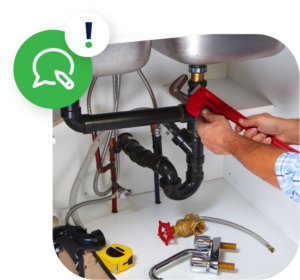 Maintaining your commercial space’s plumbing requires a different set of skills from standard residential plumbing needs. While both involve similar mechanics, the scale of commercial plumbing is significant compared to the plumbing needs for an individual residential home. Not only does commercial plumbing have different demands and code regulations, but there are also specialties—industrial, retail, food service, healthcare, general commercial, and more—that each require their own industry-specific considerations. If you have a commercial retail space, it can take a bit of time to find the right plumbing service.
Maintaining your commercial space’s plumbing requires a different set of skills from standard residential plumbing needs. While both involve similar mechanics, the scale of commercial plumbing is significant compared to the plumbing needs for an individual residential home. Not only does commercial plumbing have different demands and code regulations, but there are also specialties—industrial, retail, food service, healthcare, general commercial, and more—that each require their own industry-specific considerations. If you have a commercial retail space, it can take a bit of time to find the right plumbing service.
Most importantly, don’t wait until your space has a plumbing emergency to start your research for a qualified commercial plumber! Like many other aspects of running a retail space, this is one area where you’ll want to be extra proactive to both find a good commercial plumber and develop a solid working relationship with them before problems arise. Staying on top of your commercial plumbing by finding the right plumbing provider and keeping a regular schedule of maintenance work will keep your business’ doors open.
Find out more about how you can avoid frustrating and messy problems with your commercial space’s plumbing by keeping an eye out for common problems and by following our simple maintenance checklist.
What is the Importance of Preventative Plumbing Maintenance?
If you’ve ever seen what a plumbing emergency can do to a retail space, you don’t need to hear our doom-and-gloom explanation of the importance of avoiding that disaster. But it’s crucial to emphasize that when it comes to your building’s upkeep, preventative plumbing maintenance is a must.
Without regular facility maintenance, you run the risk of not noticing current and future plumbing issues. Even something as “simple” as a leaky pipe can cause huge problems for you and lead to major expenses, both in terms of repair costs and lost business if you need to close while it’s fixed. The best way to stay in your budget and to keep your doors open is to:
- Regularly assess your plumbing system for current and future repair needs
- Plan maintenance on a schedule that works for your company and your budget
- Talk with your commercial plumber about how your system can be at its best
Above all else, remember that a planned plumbing repair is always better than scrambling in an emergency—especially when you could have avoided the panic by sticking to your preventative maintenance plan.
Your Commercial Plumbing Preventative Maintenance Checklist
Finally, the reason you’re here—we came up with a comprehensive checklist of the major plumbing considerations you’ll want when creating your maintenance plan. These aren’t the granular, specific concerns you’ll need to address, but the big-picture considerations that will keep your pipes running right. In whatever order makes sense for you, these are the overarching plumbing issues you’ll want to keep top-of-mind:
Deal with the Smallest Issues
The biggest plumbing disasters can often be avoided if you notice smaller issues before they grow. If you notice signs that little things aren’t right—your sinks aren’t draining the way they should, or your toilet makes a strange sound, or you see water somewhere unexpected—then it’s time to investigate right away before a minor issue becomes major (and majorly expensive).
Know Where Your Plumbing Is
Imagine you’re in your business and a pipe bursts—do you know where the valve is to shut off the water? Do your employees? Make sure the answer to this is a resounding “yes,” and make sure any similar emergency can be handled with the appropriate people having the knowledge to take action when the unexpected happens.
Avoid Blocked Drains
This one might sound obvious, but you absolutely do not want your drains blocked. It can cause big problems for you down the road when the blockage grows and turns into an overflow. Also, do your best to avoid putting anything down the drain that will cause blockages, including paper, food (unless you have a garbage disposal), grease, trash, and more.
Prevent Frozen Pipes
Even in the southern United States, cold snaps can go well below freezing temperatures, but you might not be as prepared for a freeze as someone up north. Make sure you keep an eye on the weather in the winter and have a game plan for how to protect your property if you’re in danger of some icy temps.
Flush (Only) Appropriate Items
You know those signs in bathrooms that request, beg, plead, and implore for you to only flush bodily waste and sanitary tissue down the toilet? Well, you might want to consider investing in some signs like that for your bathroom, because it’s true—toilets can only handle those two things being flushed. Since you’ll have customers using your restroom, make sure to be as clear as possible about the limitations of your toilets. It’ll save you from expensive repairs in the long run, and from unpleasant emergencies in the short run from flushing failures.
Upgrade Your Equipment
When your plumbing appliances and materials are older, you face two potential problems: they’re more likely to fail, possibly at a very inopportune time, and they are possibly more expensive to run because they’re less efficient than modern equipment. There’s also the risk that some much older plumbing might no longer be in code, which is especially important for a commercial space. You can solve all these issues by upgrading your equipment to the latest in energy-efficiency, but if you aren’t ready to take the plunge on a full set of new appliances just yet, make sure to keep a closer eye on anything your plumber says could be out of date.
Meet ADA Requirements
So your plumbing meets all of the rules and regulations for sanitation and safety—great! But did you consider the needs of individuals using your commercial space’s plumbing, too? People with disabilities who patronize your space may be differently abled, and it’s possible they may have physical needs that require plumbing adjustments—like the height of toilets and bathroom sinks, as well as the space around the items for decreased movability in the case of aids like walkers and wheelchairs. It’s essential to consider how your customers will be able to function in addition to thinking about the pipes behind the walls.
Find a Commercial Plumber
Yes, we keep mentioning this one—that’s because it’s so important! Commercial plumbing is not the time to try DIY work. If you can find and keep a trusted plumber for your commercial needs, you’ll have more peace of mind and, certainly, a better plumbing system for your business.
Whether you manage this on your own or use it to guide your conversations with your commercial plumbing provider, it’s so important that you note the issues that matter most for your specific business’ plumbing needs and prioritize those potential problem areas when patrolling your plumbing systems.
Common Commercial Plumbing Maintenance Problems
Now that you know what to be on the lookout for, let’s get into specifics on what could go wrong in your retail space’s plumbing. These are some of the most common issues that can happen to any building, no matter how new or how well-maintained, though your risk is reduced with proper maintenance:
Leaks
Drip, drip, drip… it’s not just the annoying sound, it’s the waste and damage that makes leaks an issue for you! The waste is in the form of expensive water bills from an undiscovered—or untreated—leak, and the damage is if water ends up leaking somewhere it’s not supposed to be and harming the area around the drip. Check your gaskets and O-rings to make sure seals are intact, plus any other place where the pipes might be prone to failure. And leaks can be silent, too—check toilets and pipes for internal water waste that you might not otherwise notice.
Water Issues
If you’re having a problem with water temperature or getting enough volume when needed, check your water heater and the surrounding pipes to see if you have a problem. However, don’t try to fix a leaky water heater yourself—they can explode for a variety of reasons,1 so this is another thing that is best left to the professionals.
Clogs
No, we don’t mean the shoes. If your sinks or toilets are clogged (or even draining slowly, which could indicate a problem), make sure to get it checked out. Toilets should never require more than the occasional plunging, and drains that don’t drain properly could be a few steps away from overflowing.
Keep an eye out for these very common issues, and hopefully you’ll manage to avoid the stress of a plumbing emergency and the challenge of costly repairs. When you work with a dedicated commercial facility maintenance company, you’ll have a team that helps share the burden of watching out for the potential problems—plus, you’ll know exactly who to call when issues do arise.
Why You Need Retail Facility Maintenance
It’s hard to be an expert on commercial plumbing needs—that is, unless you really are an expert from a facility maintenance company! No matter what industry you’re in, the most cost-effective and easiest way to care for your facility is with a team of facility maintenance experts. Working with a professional company can help you:
Eliminate Risks
Your maintenance team can help you minimize risks through proactive service and emergency preparedness. When you work with a facility maintenance company, you’re getting a qualified team at your disposal, people who are experts with all the proper licensing and insurance, to make sure your business runs as smoothly as possible.
Increase Efficiency
Rather than calling around to solve a problem after it happens, try calling your facility maintenance company—they’ll be on-call for you to solve your issue as quickly as possible. Plus, you save your employees and yourself from the headache of having to manage something that is best left to the professionals.
Reduce Costs
Hands-on maintenance service might sound expensive, but compared to trying to track down your own experts when disaster strikes, it’s actually saving your business money to have a team at your disposal. Plus, being able to tackle problems through preventative maintenance is an unparalleled money-saving technique.
Commercial maintenance companies have the expertise, manpower, and efficiency to keep your facility in the best shape possible—and they can do it while saving you money, too. Running a commercial space is difficult enough—let us help ease some of your burdens by maintaining your property like our own.
Choose RMS for Your Commercial Plumbing Services
Retail Maintenance Specialists handles the day-to-day aspects of facility maintenance, giving your internal facility team the ability to focus on strategic and proactive initiatives. Our knowledgeable and dedicated agents provide intelligent, responsive support for all your facility maintenance needs. When it comes to plumbing, our highly trained technicians know how to get to the root of your problem and provide an effective solution as fast as possible—we can help you with any type of emergency, fixture repair or replacement and routine maintenance.
Contact us today to learn more about our plumbing services; our team of professionals will ensure that your plumbing fixtures and pipes are all installed and maintained according to building codes and safety requirements.
Source:
- Earth & Human, “Water Heater Explosions – Should You Be Concerned?”


